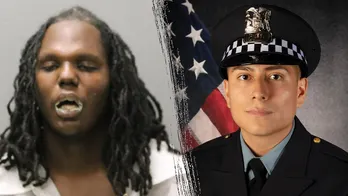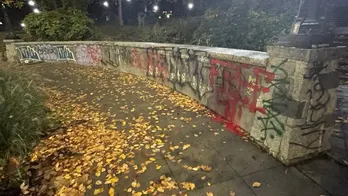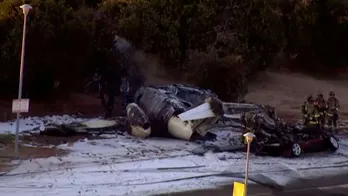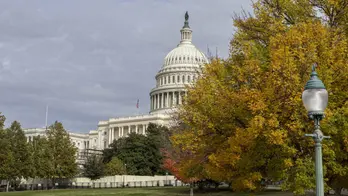Is "home" still home after 30 years away?
Brian De Los Santos reps Mexico hard. But for the vast majority of his life, that repping has been at a distance. That's because Brian is a recipient of DACA – Deferred Action for Childhood Arrivals. He was born in Veracruz, but moved to the states with his mama when he was just two And while his status under DACA affords him privileges that he wouldn't otherwise have – like the ability to get a driver's license and have a work permit – he has never been able to travel to his home country of Mexico, or anywhere outside the U.S. At least, not if he wanted to come back.
That is until March 2023. At the end of 2022, Brian applied for something called advanced parole – a permit that allows DACA-holders to travel internationally for a limited set of events: work trips, family milestones, funerals. These permits come with a lot of conditions and stipulations, and are only valid for a fixed amount of time.
So when Brian found out that he'd been accepted, he swung into action to make the opportunity of going home a reality. There was a lot he was expecting to get out of it – the chance to explore his country of birth, to hug his abuelita in person and eat her home cooking. What he wasn't expecting was for it to entirely upend his sense of identity and belonging.
Luckily for us, Brian recorded everything during that trip. As a journalist and the host of LAist's How To LA podcast, he wanted to make sure that others got a chance to learn from his experience, too. The result was a three-part series called Finding Home Con DACA. We wanted to talk to him about his experience, what the trip meant to him and to his family, and how it came to redefine his concept of home. The Q&A below has been edited and condensed for clarity – or you can listen to the conversation in this week's episode of the pod.
Lori Lizarraga: I want to start with your decision to take the trip in the first place because the stakes are high. Trying to return to the U.S. after your deadline can mean losing DACA, your driver's license, your work permit, your social security number – potentially the right to return to the life you've built in LA. And even with your Advanced Parole, it's not guaranteed that you'll be allowed back into the United States. But for you, like so many DACA recipients, the chance to visit your country of birth, to see your history and hug your abuelita in person is all worth it. Can you take us through what you were feeling before you left?
Brian De Los Santos: So first, I got a letter from the Department of Homeland Security clearing that I could go to Mexico. And I was like, I've been waiting for this moment all my life. I've always wanted to go back to visit Mexico, my country. And then it became a rush to the finish line — trying to get things in order, getting my hotels, my Airbnbs, figuring out what I'm gonna do with my family, figuring out if I'm able to go with a friend. So I didn't have time to think, until I was literally in the airport about to board the plane to Mexico, and I'm like, oh my goodness.
Throughout your podcast series, you have these wonderful snippets of conversations with your dad. It's clear in those conversations that he is almost as emotional and anxious and excited about you going to Mexico as you are. Were you expecting that when you told him about the trip?
My father actually has a Green Card, so he's able to travel freely throughout the U.S. and the world now. So we're in different statuses as a family: my parents have legal status, my brother's a U.S. citizen, and I have DACA. So the emotions my dad was carrying — I feel like maybe this brought him back to the point where he was first able to go back to visit his home country. And I think as soon as he was able to travel freely, he changed — he is a different person. So I think he was just so happy and worried at the same time for me to travel.
At one moment as I'm talking to my dad before the trip, I'm telling him, "Hey, I'm gonna go alone." And my dad's like, wait, are you sure? You know: You're not really Mexican. People are gonna see you and hear how you talk, and they're gonna notice. But dads are gonna worry – you know, dad's gonna dad!
That question of how Mexican you are came up multiple times. You have this experience at one point where you ask your friend Javi, who was born and raised in Mexico, how he views you. And he says culturally, he perceives you as a gringo. Eventually you start to see things from his perspective, but initially, you really push back on that. Why?
That conversation was such an eyeopener, Lori! Because I was trying to defend myself like, Hey dude, I am undocumented. You don't understand, I am not gringo at all. I represent my community out there in L.A. Like I'm Mexican as f***. I don't feel gringo. And he was just like, "But, culturally, you are." He was kind of shading me, you know? He was spilling the tea and I'm like, girl, I'm not ready for this conversation.
What's funny is that after that conversation, we get to Coyoacán and there are a lot of street vendors there, and of course as I was trying to speak Spanish, people were like, "Oh, where are you from?" And I'm like, "Well I'm from Veracruz, but I live in LA." And they went 're like, "Oh yeah, you can tell." I was just like, oh my God.
Like it's all slapping you in the face in a lot of different ways.
Yes! But it did change the perspective of who I am in the United States now. I really do identify as a pocho. I'd always thought that term was kind of derogatory. But as I leaned into it and I thought about what Javi was saying I was just like, it's true. Even though the papers don't say "U.S. citizen" or "U.S legal resident", I'm a little bit of both and I'm okay with that. It doesn't take away from my experience, which is my own. And I think that's what he was trying to tell me. Like, yo, you are who you are, and there's nothing wrong with that.
In my fantasy world, I would have better Spanish and kind of sound chilango like him, someone from the city. But it's also my truth to have a bit of a broken Spanish, and sound like a pocho, and dress like an American, and like hip hop but also reggaeton. Before, I thought that I had to code switch a lot more and now I'm just like, you know what? It's Spanglish. It is Mexican American. Well, sorry — I don't say that. I don't say that I'm "Mexican American," but I do say I'm Mexican with my roots here in the U.S.
Why — why is that something you specifically don't say?
I feel like I would be kind of erasing my experience of being a Mexican. I think that when someone asks me where I'm from, I like to note that I carry an undocumented experience. I'll say, I was born in Veracruz, Mexico, but I came to the States when I was two and I've lived in L.A. and D.C. and Palm Springs – I kind of just give them that little elevator speech. And if they have questions, they can ask.
And part of it as well, is like, until I get my U.S.citizenship, only then could I maybe say, Mexican American.
That makes sense. Are you the last one in your family who doesn't get to say that you're a citizen – that doesn't get to identify yourself as Mexican American?
I'm the only one. My parents have been legal Green Card holders for a few years now, and are on their way to becoming U.S. citizens. My brother was born here, so he is a U.S. citizen. I'm still with DACA. And that's my immediate family — I do have other family members living in the United States who are undocumented or here with work permits. But in my immediate family, it's just me, and it's interesting. You know, my parents are actually leaving to go to Spain soon, and then they're going to go to Mexico, and so they're going to do these trips that have to do with their work as ministers. And you know, I'm just like, Oh, well, that's beautiful. That's wonderful. Yes, I'll watch your dog mom. (Laughs)
I mean, Brian, does that make you feel angry, ever?
I get angry at the system. I'm never angry or upset at my parents. I'm happy that they're blessed and they're doing what they're doing. But it is unfair, and that gets to me — that there are pathways for other people, and I just haven't been able to score mine. So it is bittersweet to see these experiences, yeah.
Do you hope one day to be able to identify yourself as Mexican-American?
I mean, I want the papers, honey! I feel like this country is mine as much as Mexico is my home country.
How has your understanding of home changed since the trip?
Before traveling, I thought, you know, I'm gonna go to the beach, I'm gonna do cute things in Mexico City and go to gay clubs and then be at home in Vera Cruz. I thought I was going to meet my abuelita and have her home cooking and maybe do touristy things with my cousins. But I didn't think I was gonna come back and be like, "Okay, this is definitely home." And I think maybe the message here is that I was fortunate enough to go home and feel peace in where I was at and feel like this is part of who I am. Home is Mexico — that is going to be my home as well, just like LA is my home. So home, I think, is really where you have a memory that makes you a fuller human.
Disclaimer: The copyright of this article belongs to the original author. Reposting this article is solely for the purpose of information dissemination and does not constitute any investment advice. If there is any infringement, please contact us immediately. We will make corrections or deletions as necessary. Thank you.







